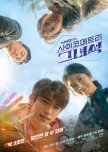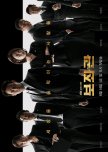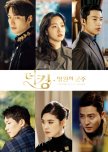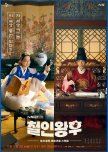
This review may contain spoilers
Cho Byeong-kyu: guru of limping characters
Adorable orphan himbo with uncomfortable superpower meets smart, confident girl on a quest to clear her father's name.This is basically the core character dynamic of this drama. We also get the unfailingly entertaining big brother/little brother/unconventional found-family combo that always seals the deal for me.
He is Psychometric manages to go even beyond the excellent weaving of relationships among interesting characters and builds upon a comfortably intricate plot.
There are only two downsides in this otherwise outstanding drama.
First and foremost, it is notably lacking in the suspense department for a thriller. We come to expect every turning point of the plot because it is foreshadowed clearly just before its occurrence (except for the main one that is, however, given out with 3 episodes of not-so-subtle hints before the final revelation).
The story remains engaging nonetheless, it is just not very thrilling.
My second criticism is about the choice of founding much of the plot resolution on a (M. Night)Shyamalan type of twist. It is a cool gimmick but decreases, inevitably, the whole drama rewatchability.
These are the main drawbacks in terms of screenplay, but I don't think they affect much the drama's overall enjoyable vibe. The cast, in fact, makes a very fine job in drawing the viewer's attention.
My favorite character is Kang Sung-mo, which is played by the impressive Kim Kwon. He is a new entry in my kdrama hotties' Olympus as I don't think I've encountered him in my previous viewings.
His character is definitely the most complex as he undergoes a progressive humanization throughout the story. Starting from an inscrutable, rational, super-human (as in "very-little-like the humans we know") upstanding hero (on the metaphorical pedestal of a rooftop apartment) that functions almost like a deus-ex-machina for the young protagonists, he descends all the way to the underworld (the subway abandoned station, the underground prison) becoming the irrational, sub-human executioner driven by the need for survival, protection and revenge.
Although a diagnosis of alexithymia makes everybody question his ability to feel emotions, we are often reminded that being unable to express emotions is indeed different from being unable to feel them.
Park Jin-young is fairly convincing as the warmhearted himbo. His Lee Ahn is cute and endearing and does a great job of lightening the tone even when the story grows darker. The character also serves as a counterpoint to Sung-mo, in many ways. For example, where a teenager Sung-Mo made a terrible choice (he regretted soon after) because he felt trapped in the absence of trusted adult guidance, teenager Ahn was able to turn his life around and overcome his anger (thanks to the guidance of the very same Sung-Mo).
Shin Ye-eun also does a decent job, although she isn't particularly brilliant. I think the main couple has the highest romantic tension in the high school episodes and it mellows out later on. The actors have chemistry, but it feels friendly in nature more than romantic. I think it is a writing choice resulting from the intention of focusing more on other plot points and themes. In this respect, the brief moment of angst between the main couple was a bit useless and felt perfunctory.
The second couple is much more entertaining, in my opinion.
When reaching the end of this drama, someone might think the writer is implying that a bad seed is a bad seed and it is impossible to transcend genes and conditioning.
Both father and son seem to be condemned to the same fate of isolation from society. They are both behind bars, yet there is a fundamental difference in their confinement. Whilst the father is sentenced to never leaving those bars, not even the invisible ones tying him to his horrific childhood, Sung-mo is instead finally allowed to escape the prison of his past through atonement. I loved the fact that despite the terrible murders he committed, the writer didn't opt for an unredeemed suicide and instead told us that the hardest choice is asking for forgiveness and living to atone for the hurt caused.
It is a very Christian solution and, in fact, there are explicit Christian references all throughout the drama as it is also apparent with the theme of forgiveness that recurs in the relationship dynamics of the characters every so often.
The writer makes another important point by including a reflection on collective responsibility. The monsters in her story are the product of a faulty and corrupted society.
I believe there is also a theme of disgust: people picking their nose and leaving boogers under the desk, people eating things found on the floor, people touching corpses, people pulling nose hairs and flicking them in other people's faces and ongoing talks of festering wounds. Is it because human condition is inherently execrable? Who knows?
I really liked the visual representation of psychometry although it didn't make much sense with the shifting point of view (does Ahn see things from his POV, does he see them from the object's POV? It varies).
The title of the review refers to the fact that it is funny (only to me) to see Cho Byeong-kyu limping again after watching the Uncanny Counter (albeit chronologically speaking HIP comes first).
Female Empowerment Score 4/5 we had to sacrifice the female detective to convince men to take responsibility for their actions. On the other hand, I love the natural comradery, the girls' friendships. I also love that the women in this drama are smart and don't wait around to be saved but, instead, become the hero they need.
Was this review helpful to you?

This review may contain spoilers
House of Kards
I had this planned on my watchlist since the beginning of my journey into k-drama, mostly because of Shin Min-Ah (she's fabulous, beautiful and talented and I want to be just like her when I grow up…) but also because I really dig the political subgenre (my second most favorite after historical dramas, and immediately followed by sci-fi. Turns out romantic dramas are really my least favorite)My overall judgement is positive, but I really wouldn't recommend this to any k-drama neophyte. I found it difficult to watch because I was often bored. It took me almost 3 weeks to finish all the 20 episodes (1st and 2nd season) and I had to mix it with something else (Divorce Attorney Shin was the perfect buffer). Ultimately, I am glad to have persevered to the last episode because it was satisfying enough to deem the whole experience as positive.
Basically, the main theme hinges on an ethical conundrum of Machiavellian inspiration:
how evil can good guys go when fighting evil in order to still be considered good guys? Do you need to fight dirty to prevail in a corrupted and unfair fight?
The answer to this question is universally controversial and I liked the one in the drama well enough, however the execution was rather poor.
Writers (Lee Dae-il, who also adapted the original comic for Bring it on, Ghost!) could have delved deeper and dared more since they had a great cast that could definitely sustain a heavier load.
Politics is complex and if one decides to explore the shades of grey behind it, they cannot resolve the issue by reducing it to black and white.
During the watch I was reminded of two personal favorites in the genre, House of Cards and the West Wing. Yet the similarity goes only as far as the setting since Chief of Staff lacks the depth, the intricacy and the absolute commitment to the story, characters and political commentary that those two masterpieces have.
Here the story is oversimplified and, in my totally unessential opinion, that is in detriment to the overall vibe.
I like when writers trust their audience with the complexity of fiction that mimics the truth of life.
That is one reason why I really appreciated Stranger, for example.
I love Lee Jung-jae and I find his voice beautiful, still the first person narration sounded awkward to me most of the time.
I really liked when they talked about abortion though.
Also, I liked the glimpse of fanservice amidst the seriousness ( Do-Kyeong's great abs were good for the morale).
Therefore my score is earned in full by the actors' performance, the bits of political commentary and the happy ending.
FES(5/5) Shin Min-Ah in power suits is indeed powerful!
Was this review helpful to you?

This review may contain spoilers
A 20 hour long commercial with beautiful horses
First of all: so much advertising! I mean, at times it felt like watching an elaborate commercial.It was really distracting and my main reason for the low score.
Normally, I'm super into space-time paradoxes (among my absolute favorites within the sci-fi genre), but this is messy and, most of all, terribly boring (I'm so very disappointed in Kim Eun-sook).
I fell asleep multiple times.
By episode 5 one can easily guess the masked savior's identity and still fail to understand the mechanics of the parallel worlds created by the writer. For instance, how is it possible for universes that diverged for hundreds of years to have the same people, born on the same year and day from the same doppelgangers?! And how does it make sense to base everything on this premise and still assert that a different choice or being a second late can cause chaos in the space-time continuum?!!!
Despite their individual talent, the main couple was tepid throughout. The characters were dull and their love just came to be so suddenly that it was as nonsensical as the plot.
At one point I rooted for the prime minister, she looked like an interesting one with her political schemes and feminine outfits, but even that fell to nothing.
Honorable mention for Woo Do-hwan that tried his very best here and kept me watching to the end.
Female Empowerment Score 3/5: the three points go to the cool building-owner and, in a smaller percentage, to the prime minister lady.
Was this review helpful to you?

This review may contain spoilers
Ode to Shin Hye-sun
Mr. Queen is a historical, gender-bender comedy that is extremely fun and definitely binge-watchable.I don't know the original works inspiring this one (both the webtoon and Chinese web series are known as "Go princess go") but I can tell that it functions well both as a parody (especially in the first episodes) and as a proper Korean historical drama.
The plot has the right amount of palace intrigue and power plays all experienced throughout the eyes of a 21st century man that effectively becomes the audience avatar.
His internal commentary is our commentary and, most of the time, it is hilarious.
Queen So-yong is the absolute protagonist of this drama and Shin Hye-sun rises to the challenge gloriously.
I've met her in Stranger and loved her character back then too.
She is versatile and talented with both perfect comedic timing and dramatic skills.
The romantic chemistry with Kim Jung-hyun (funny and sexy man whom I've absolutely loved in Eulachacha Waikiki and Crash Landing on You) is through the roof and they have steamy scenes that are going to make you laugh and blush at the same time. The supporting cast is solid (shoutout for Cha Chung-hwa and Jeon Bae-soo) although their characters are mostly just cartoonish comic relief.
The pacing is well sustained and it makes you forget eventual plot holes, however the gender-swap theme is the true weakness of this drama (and the main reason why my rating was lowered one full point).
Clearly Korean television deems the exploration of unconventional romance (namely a possibly gay relationship) as too controversial. Jang Bong-hwan's return to his reality was rushed, perhaps to avoid any consideration on said romance. Pity, because I was very curious to see how his emotional growth, resulting from experiencing the world in a woman's shoes, translated to a male, modern environment.
Female Empowerment Score 2/5: the only kickass girl in the series is possessed by a man. The evil queens are either petty or blinded by the fear of aging. The king's first love is an insecure liar who at least is able to redeem herself towards the end (and secure the second point on this score).
Was this review helpful to you?





